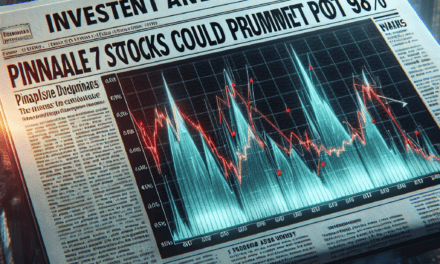“Invest Wisely: Discover Warren Buffett’s Top Stock Picks for November!”
Introduction
Warren Buffett, the legendary investor and CEO of Berkshire Hathaway, has long been revered for his astute investment strategies and ability to identify high-quality stocks with strong growth potential. As we move into November, investors keen on emulating Buffett’s success might consider examining his portfolio for promising opportunities. Buffett’s investment philosophy typically focuses on companies with solid fundamentals, competitive advantages, and strong management teams. This approach has consistently yielded impressive returns over the decades. In this context, exploring the top Warren Buffett stocks to consider buying in November can provide valuable insights into potential investment opportunities that align with his time-tested principles.
Analyzing Berkshire Hathaway’s Portfolio: Top Picks for November
As November unfolds, investors often look to the portfolios of successful investors for guidance, and few portfolios are as closely watched as that of Warren Buffett’s Berkshire Hathaway. Known for his value investing philosophy, Buffett’s stock picks are often seen as a barometer for market trends and a source of potential investment opportunities. Analyzing Berkshire Hathaway’s portfolio reveals several stocks that stand out as top picks for November, offering a blend of stability, growth potential, and alignment with Buffett’s long-term investment strategy.
One of the most prominent stocks in Berkshire Hathaway’s portfolio is Apple Inc. This technology giant has consistently been a significant holding for Buffett, reflecting his confidence in its robust business model and innovative product line. Apple’s strong brand loyalty, coupled with its expanding ecosystem of products and services, positions it well for continued growth. Moreover, the company’s commitment to returning capital to shareholders through dividends and share buybacks makes it an attractive option for investors seeking both growth and income.
Transitioning from technology to the financial sector, Bank of America is another noteworthy stock in Buffett’s portfolio. As one of the largest financial institutions in the United States, Bank of America benefits from a diversified revenue stream and a strong balance sheet. The bank’s focus on digital transformation and cost efficiency has enhanced its competitive position, making it a compelling choice for investors looking to capitalize on the financial sector’s recovery. Additionally, the potential for rising interest rates could further bolster the bank’s profitability, providing a tailwind for its stock performance.
In the consumer goods sector, Coca-Cola remains a staple in Berkshire Hathaway’s holdings. This iconic beverage company has demonstrated resilience through various economic cycles, thanks to its global brand recognition and extensive distribution network. Coca-Cola’s strategic initiatives to diversify its product offerings and adapt to changing consumer preferences have positioned it for sustained growth. Furthermore, its consistent dividend payments make it an appealing option for income-focused investors seeking stability in their portfolios.
Shifting focus to the energy sector, Chevron is a notable inclusion in Buffett’s portfolio. As one of the world’s leading integrated energy companies, Chevron is well-positioned to benefit from the ongoing recovery in oil prices. The company’s disciplined capital allocation and focus on cost management have strengthened its financial position, enabling it to navigate the volatility inherent in the energy markets. Additionally, Chevron’s commitment to sustainable energy initiatives aligns with the growing emphasis on environmental, social, and governance (ESG) factors, making it an attractive choice for investors with a long-term perspective.
Lastly, in the realm of consumer discretionary, Amazon.com has emerged as a significant holding for Berkshire Hathaway. While traditionally known for its e-commerce dominance, Amazon’s expansion into cloud computing, digital advertising, and other high-growth areas has transformed it into a diversified technology powerhouse. The company’s relentless focus on innovation and customer experience continues to drive its competitive advantage, offering substantial growth potential for investors willing to embrace its premium valuation.
In conclusion, analyzing Berkshire Hathaway’s portfolio provides valuable insights into potential investment opportunities for November. Stocks like Apple, Bank of America, Coca-Cola, Chevron, and Amazon.com exemplify the diverse range of industries and growth prospects that align with Warren Buffett’s investment philosophy. By considering these top picks, investors can gain exposure to companies with strong fundamentals and the potential for long-term value creation, thereby enhancing their own investment strategies in the ever-evolving market landscape.
Why Apple Remains a Strong Bet in Buffett’s Portfolio
Warren Buffett, the legendary investor and CEO of Berkshire Hathaway, has long been known for his astute investment strategies and ability to identify companies with enduring value. Among the myriad of stocks in his portfolio, Apple Inc. stands out as a particularly significant holding. As of November, Apple remains a strong bet in Buffett’s portfolio, and understanding the reasons behind this can provide valuable insights for investors considering their own positions in the tech giant.
To begin with, Apple’s robust financial performance and consistent innovation make it a compelling choice for long-term investment. The company has demonstrated an impressive ability to generate substantial revenue and profit, driven by its diverse product lineup and strong brand loyalty. Apple’s flagship products, such as the iPhone, iPad, and Mac, continue to dominate their respective markets, while its services segment, including the App Store, Apple Music, and iCloud, has shown remarkable growth. This diversification not only provides multiple revenue streams but also mitigates risks associated with reliance on a single product line.
Moreover, Apple’s commitment to innovation ensures that it remains at the forefront of technological advancement. The company’s continuous investment in research and development has led to groundbreaking products and services that capture consumer interest and drive sales. For instance, the introduction of the M1 chip has revolutionized the performance of Apple’s Mac computers, setting new standards in the industry. Such innovations not only enhance the user experience but also solidify Apple’s competitive edge, making it a formidable player in the tech sector.
In addition to its financial and innovative strengths, Apple’s strong balance sheet and shareholder-friendly policies further enhance its appeal. The company boasts a substantial cash reserve, providing it with the flexibility to invest in new opportunities, weather economic downturns, and return capital to shareholders. Apple’s commitment to returning value to its investors is evident in its consistent dividend payments and share repurchase programs. These initiatives not only reward shareholders but also reflect the company’s confidence in its future prospects.
Furthermore, Apple’s global presence and brand recognition contribute to its resilience in an ever-changing market landscape. The company’s ability to adapt to different regions and consumer preferences has enabled it to maintain a strong foothold in both developed and emerging markets. This global reach not only drives revenue growth but also positions Apple to capitalize on new opportunities as they arise.
Transitioning to the broader context of Buffett’s investment philosophy, Apple’s alignment with his principles of value investing is noteworthy. Buffett has long advocated for investing in companies with strong fundamentals, competitive advantages, and capable management. Apple embodies these characteristics, making it a natural fit for his portfolio. The company’s ability to generate consistent cash flow, maintain a loyal customer base, and innovate effectively aligns with Buffett’s criteria for a sound investment.
In conclusion, Apple’s enduring strengths make it a compelling choice for investors seeking a reliable and growth-oriented stock. Its robust financial performance, commitment to innovation, strong balance sheet, and global presence underscore its position as a leader in the tech industry. For those considering their investment options in November, Apple’s continued prominence in Warren Buffett’s portfolio serves as a testament to its potential for long-term value creation. As always, investors should conduct their own research and consider their individual financial goals before making investment decisions.
The Appeal of Bank of America: A Buffett Favorite
Warren Buffett, the legendary investor and CEO of Berkshire Hathaway, has long been known for his astute investment choices and his ability to identify undervalued companies with strong growth potential. Among his many investments, Bank of America stands out as a particularly appealing choice, especially for those looking to make informed decisions in the stock market this November. As one of Buffett’s favorite stocks, Bank of America offers a compelling case for investors seeking stability and growth in their portfolios.
To begin with, Bank of America is one of the largest financial institutions in the United States, boasting a robust balance sheet and a diverse range of financial services. This diversity allows the bank to weather economic fluctuations more effectively than many of its peers. Furthermore, its strong capital position and prudent risk management practices have enabled it to maintain a solid footing even during challenging economic times. This resilience is a key factor that has likely contributed to Buffett’s continued confidence in the bank.
Moreover, Bank of America’s focus on digital transformation has positioned it well for future growth. The bank has made significant investments in technology to enhance its digital banking capabilities, which has not only improved customer experience but also reduced operational costs. This strategic emphasis on digital innovation is crucial in an era where consumers increasingly prefer online and mobile banking solutions. By staying ahead of the curve, Bank of America is likely to continue attracting a tech-savvy customer base, thereby driving long-term growth.
In addition to its technological advancements, Bank of America’s commitment to shareholder returns is another attractive feature for investors. The bank has consistently returned capital to shareholders through dividends and share buybacks, reflecting its strong financial health and management’s confidence in its future prospects. For income-focused investors, the bank’s dividend yield is particularly appealing, offering a steady stream of income in a low-interest-rate environment.
Furthermore, the broader economic environment also plays a role in enhancing the appeal of Bank of America as an investment. With the Federal Reserve’s monetary policy decisions impacting interest rates, banks like Bank of America stand to benefit from a rising interest rate environment. Higher interest rates can lead to improved net interest margins, which in turn can boost the bank’s profitability. This potential for increased earnings makes Bank of America an attractive option for investors looking to capitalize on macroeconomic trends.
Additionally, Warren Buffett’s endorsement of Bank of America cannot be overlooked. His investment philosophy, which emphasizes buying quality companies at reasonable prices and holding them for the long term, aligns well with the bank’s strengths. Buffett’s substantial stake in Bank of America serves as a vote of confidence in its management and business model, further solidifying its status as a top stock to consider.
In conclusion, Bank of America’s strong financial position, focus on digital innovation, commitment to shareholder returns, and favorable economic conditions make it a compelling choice for investors this November. Coupled with Warren Buffett’s endorsement, the bank’s potential for growth and stability presents a promising opportunity for those looking to enhance their investment portfolios. As always, investors should conduct their own research and consider their individual financial goals before making any investment decisions.
Coca-Cola’s Enduring Value: A Buffett Staple
Coca-Cola has long been a cornerstone of Warren Buffett’s investment portfolio, embodying the principles of value investing that have defined his illustrious career. As we consider the top Warren Buffett stocks to buy in November, Coca-Cola’s enduring value makes it a compelling choice for investors seeking stability and long-term growth. The beverage giant’s consistent performance, strong brand recognition, and strategic adaptability underscore its appeal as a Buffett staple.
To begin with, Coca-Cola’s robust brand equity is a significant factor contributing to its enduring value. The company has cultivated a global brand that resonates with consumers across diverse markets, making it one of the most recognizable names in the world. This brand strength translates into pricing power, allowing Coca-Cola to maintain profitability even in competitive environments. Furthermore, the company’s extensive distribution network ensures that its products are readily available to consumers worldwide, reinforcing its market dominance.
In addition to its brand strength, Coca-Cola’s financial stability is another reason why it remains a favorite in Buffett’s portfolio. The company has consistently demonstrated strong financial performance, characterized by steady revenue growth and healthy profit margins. Its ability to generate substantial free cash flow enables Coca-Cola to return value to shareholders through dividends and share buybacks. This financial resilience is particularly appealing in times of economic uncertainty, as it provides a buffer against market volatility.
Moreover, Coca-Cola’s strategic adaptability has allowed it to navigate changing consumer preferences and industry trends effectively. In recent years, the company has expanded its product portfolio beyond traditional carbonated beverages to include a diverse range of offerings such as bottled water, sports drinks, and plant-based beverages. This diversification strategy not only mitigates risks associated with shifting consumer tastes but also positions Coca-Cola to capture growth opportunities in emerging segments. By investing in innovation and sustainability, the company is well-equipped to meet the evolving demands of health-conscious consumers.
Transitioning to the broader market context, Coca-Cola’s defensive characteristics make it an attractive option for investors seeking stability amid market fluctuations. The company’s products are considered consumer staples, meaning they are in constant demand regardless of economic conditions. This inherent stability provides a degree of insulation from economic downturns, making Coca-Cola a reliable choice for risk-averse investors. Additionally, the company’s global presence offers exposure to emerging markets, where rising disposable incomes and urbanization trends present significant growth potential.
Furthermore, Coca-Cola’s commitment to sustainability and corporate responsibility enhances its long-term investment appeal. The company has set ambitious goals to reduce its environmental footprint, including initiatives to improve water efficiency, reduce carbon emissions, and promote recycling. These efforts not only align with growing consumer and regulatory expectations but also contribute to the company’s reputation as a responsible corporate citizen. By prioritizing sustainability, Coca-Cola is positioning itself for continued success in an increasingly environmentally conscious world.
In conclusion, Coca-Cola’s enduring value as a Buffett staple is underpinned by its strong brand equity, financial stability, strategic adaptability, and commitment to sustainability. As investors consider top Warren Buffett stocks to buy in November, Coca-Cola’s defensive characteristics and growth potential make it a compelling choice. By maintaining a focus on long-term value creation, the company exemplifies the principles of value investing that have guided Buffett’s investment philosophy for decades.
Investing in American Express: Insights from Buffett’s Strategy
Warren Buffett, the legendary investor and CEO of Berkshire Hathaway, has long been admired for his astute investment strategies and ability to identify undervalued companies with strong growth potential. Among his many successful investments, American Express stands out as a prime example of his long-term approach and confidence in the financial services sector. As we consider the top Warren Buffett stocks to buy in November, it is essential to delve into the insights that can be gleaned from his investment in American Express.
Buffett’s investment philosophy is rooted in the principles of value investing, which involves identifying companies with strong fundamentals, competitive advantages, and the potential for sustainable growth. American Express, a leading global financial services company, aligns well with these criteria. Its robust brand reputation, extensive network, and loyal customer base have contributed to its enduring success. Moreover, American Express’s focus on premium customers and its ability to adapt to changing market dynamics have further solidified its position in the industry.
One of the key reasons Buffett has maintained a significant stake in American Express is the company’s strong economic moat. This term, popularized by Buffett himself, refers to a company’s ability to maintain a competitive edge over its rivals, thereby protecting its long-term profitability. American Express’s moat is evident in its closed-loop network, which allows it to capture valuable data on consumer spending patterns and tailor its offerings accordingly. This unique business model not only enhances customer loyalty but also provides the company with a wealth of insights to drive innovation and growth.
In addition to its economic moat, American Express has demonstrated resilience in the face of economic challenges. During periods of financial uncertainty, the company’s focus on affluent customers has proven advantageous, as this demographic tends to be less affected by economic downturns. Furthermore, American Express’s diversified revenue streams, which include interest income, fees, and merchant services, provide a stable financial foundation that can weather market fluctuations.
Buffett’s investment in American Express also underscores the importance of a strong management team. Under the leadership of CEO Stephen Squeri, the company has continued to execute its strategic vision, focusing on digital transformation and expanding its global footprint. This forward-thinking approach has enabled American Express to capitalize on emerging trends, such as the shift towards digital payments and the growing demand for personalized financial services.
As investors consider adding American Express to their portfolios in November, it is crucial to recognize the company’s commitment to shareholder value. American Express has consistently returned capital to shareholders through dividends and share buybacks, reflecting its confidence in future growth prospects. This commitment, coupled with its strong financial performance, makes American Express an attractive investment opportunity for those seeking exposure to the financial services sector.
In conclusion, Warren Buffett’s investment in American Express offers valuable insights into the qualities that define a successful long-term investment. By focusing on companies with strong economic moats, resilient business models, and capable management teams, investors can emulate Buffett’s approach and potentially achieve similar success. As we navigate the complexities of the current market environment, American Express stands out as a compelling option for those looking to invest in a company with a proven track record and promising future.
The Growth Potential of Chevron in Buffett’s Holdings
Warren Buffett, the legendary investor and CEO of Berkshire Hathaway, has long been known for his astute investment choices and his ability to identify companies with strong growth potential. Among his diverse portfolio, Chevron stands out as a significant holding, reflecting Buffett’s confidence in the energy sector’s future. As we delve into the growth potential of Chevron within Buffett’s holdings, it is essential to understand the factors that make this energy giant an attractive investment opportunity.
Chevron, one of the world’s leading integrated energy companies, has consistently demonstrated resilience and adaptability in a rapidly changing industry. The company’s robust financial health, characterized by a strong balance sheet and consistent cash flow generation, provides a solid foundation for future growth. This financial stability allows Chevron to invest in new projects and technologies, ensuring its competitiveness in the evolving energy landscape. Moreover, Chevron’s commitment to returning value to shareholders through dividends and share buybacks aligns with Buffett’s investment philosophy, which prioritizes long-term value creation.
In addition to its financial strength, Chevron’s strategic initiatives position it well for future growth. The company has been actively investing in renewable energy and low-carbon technologies, recognizing the global shift towards cleaner energy sources. By diversifying its energy portfolio, Chevron is not only mitigating risks associated with traditional fossil fuels but also capitalizing on emerging opportunities in the renewable sector. This strategic pivot is crucial as the world increasingly prioritizes sustainability and environmental responsibility.
Furthermore, Chevron’s global presence and extensive operational expertise provide a competitive edge in the energy market. The company’s vast network of upstream and downstream operations enables it to efficiently manage its resources and optimize production processes. This operational efficiency, coupled with its ability to adapt to market fluctuations, enhances Chevron’s growth prospects. As energy demand continues to rise, particularly in emerging markets, Chevron’s global footprint positions it to capture new opportunities and expand its market share.
Another factor contributing to Chevron’s growth potential is its focus on technological innovation. The company has been leveraging advanced technologies to improve operational efficiency and reduce costs. For instance, Chevron’s use of digital tools and data analytics in exploration and production activities has led to significant improvements in resource management and decision-making processes. By embracing innovation, Chevron is not only enhancing its current operations but also laying the groundwork for future advancements in the energy sector.
Moreover, Chevron’s strategic partnerships and collaborations further bolster its growth potential. By partnering with other industry leaders and research institutions, Chevron is able to access new technologies and expertise, accelerating its progress in developing sustainable energy solutions. These collaborations also enable Chevron to share risks and resources, enhancing its ability to undertake large-scale projects and explore new markets.
In conclusion, Chevron’s growth potential within Warren Buffett’s holdings is underpinned by its financial strength, strategic initiatives, global presence, technological innovation, and collaborative efforts. As the energy sector continues to evolve, Chevron’s ability to adapt and capitalize on emerging trends positions it as a compelling investment opportunity. For investors seeking exposure to the energy market with a focus on long-term growth, Chevron represents a promising choice within Buffett’s portfolio. As November approaches, considering Chevron as part of a diversified investment strategy could prove beneficial for those looking to align with Buffett’s proven investment principles.
Understanding Buffett’s Investment in Kraft Heinz
Warren Buffett, the legendary investor and CEO of Berkshire Hathaway, has long been a figure of fascination for those interested in the stock market. His investment strategies, often characterized by a focus on value and long-term growth, have consistently yielded impressive returns. Among his diverse portfolio, Kraft Heinz stands out as a significant holding, reflecting Buffett’s enduring belief in the potential of consumer staples. Understanding Buffett’s investment in Kraft Heinz requires a closer look at both the company’s fundamentals and the broader market context.
Kraft Heinz, formed through the merger of Kraft Foods Group and H.J. Heinz Company in 2015, is one of the largest food and beverage companies globally. This merger was orchestrated with the backing of Berkshire Hathaway and 3G Capital, a Brazilian private equity firm known for its aggressive cost-cutting strategies. Buffett’s involvement in this deal was not merely financial; it was a strategic move that aligned with his investment philosophy. He has often emphasized the importance of investing in companies with strong brand recognition and consistent demand, qualities that Kraft Heinz embodies.
The appeal of Kraft Heinz to Buffett lies in its portfolio of iconic brands, including Heinz Ketchup, Kraft Macaroni & Cheese, and Oscar Mayer. These products have become staples in households worldwide, providing a steady revenue stream that is relatively insulated from economic downturns. In times of market volatility, consumer staples like those offered by Kraft Heinz tend to perform well, as they are essential goods that people continue to purchase regardless of economic conditions. This resilience is a key factor in Buffett’s decision to maintain a significant stake in the company.
However, the journey has not been without challenges. Kraft Heinz has faced criticism for its cost-cutting measures, which some argue have come at the expense of innovation and growth. The company has also grappled with changing consumer preferences, as more people seek healthier and more sustainable food options. These challenges have led to fluctuations in the company’s stock price, prompting some investors to question the wisdom of Buffett’s investment. Nevertheless, Buffett’s long-term perspective allows him to look beyond short-term setbacks, focusing instead on the company’s potential for recovery and growth.
Moreover, Buffett’s investment in Kraft Heinz is a testament to his belief in the power of strategic partnerships. The collaboration with 3G Capital has brought about significant operational efficiencies, although it has also highlighted the need for a balanced approach that fosters both cost management and innovation. This partnership underscores Buffett’s ability to leverage relationships to enhance the value of his investments, a skill that has been instrumental in his success.
In conclusion, Warren Buffett’s investment in Kraft Heinz is a reflection of his broader investment philosophy, which prioritizes strong brands, consistent demand, and strategic partnerships. While the company faces challenges, its position in the consumer staples sector provides a level of stability that aligns with Buffett’s preference for low-risk, high-reward opportunities. For investors considering adding Kraft Heinz to their portfolios, understanding Buffett’s rationale offers valuable insights into the potential benefits and risks associated with this stock. As November approaches, those looking to emulate Buffett’s success may find Kraft Heinz to be a compelling option, provided they are prepared to adopt a long-term perspective and navigate the complexities of the modern food industry.
Q&A
1. **Apple Inc. (AAPL)**
– Apple remains a cornerstone of Warren Buffett’s portfolio due to its strong brand, consistent revenue growth, and robust ecosystem.
2. **Bank of America Corp. (BAC)**
– Buffett appreciates Bank of America’s strong management, solid financial position, and its role as a leading financial institution.
3. **Coca-Cola Co. (KO)**
– Coca-Cola is a long-term holding for Buffett, valued for its global brand recognition and steady dividend payouts.
4. **American Express Co. (AXP)**
– Buffett favors American Express for its strong brand, customer loyalty, and consistent earnings growth.
5. **Chevron Corp. (CVX)**
– Chevron is attractive to Buffett for its strong cash flow, dividend yield, and position in the energy sector.
6. **Kraft Heinz Co. (KHC)**
– Despite challenges, Buffett holds Kraft Heinz for its potential in the consumer goods sector and cost-cutting initiatives.
7. **Moody’s Corporation (MCO)**
– Moody’s is valued for its dominant position in credit ratings and analytics, providing consistent revenue and growth potential.
Conclusion
In November, investors looking to align with Warren Buffett’s investment philosophy might consider focusing on stocks that reflect his principles of value investing, strong fundamentals, and long-term growth potential. Key stocks often associated with Buffett’s portfolio include Apple, known for its robust ecosystem and consistent revenue growth; Bank of America, which benefits from rising interest rates and a strong financial position; and Coca-Cola, a classic Buffett pick with a strong global brand and reliable dividend. Additionally, companies like American Express and Kraft Heinz offer exposure to consumer spending and staple goods, respectively. These stocks typically exhibit characteristics such as competitive advantages, solid management, and financial resilience, making them attractive options for investors seeking stability and growth in uncertain market conditions.





